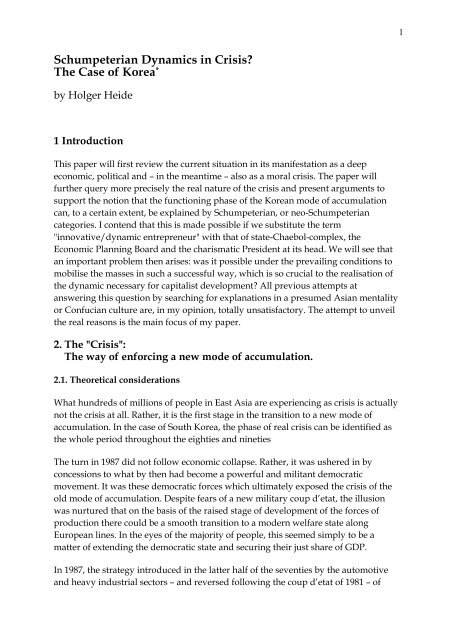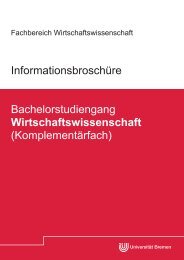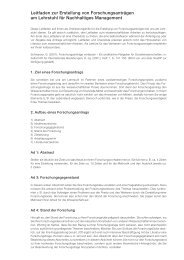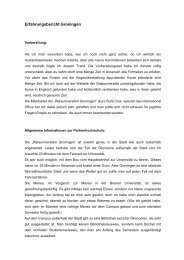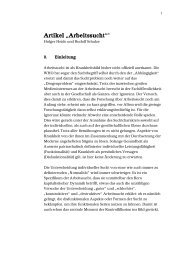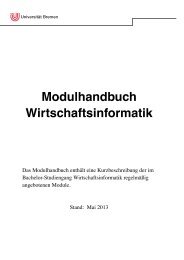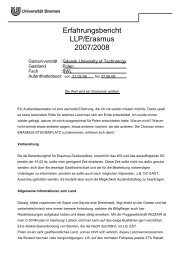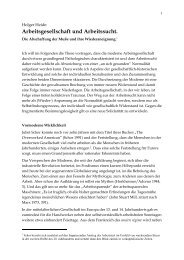Holger Heide Schumpeterian Dynamics in Crisis - Universität Bremen
Holger Heide Schumpeterian Dynamics in Crisis - Universität Bremen
Holger Heide Schumpeterian Dynamics in Crisis - Universität Bremen
You also want an ePaper? Increase the reach of your titles
YUMPU automatically turns print PDFs into web optimized ePapers that Google loves.
1<br />
<strong>Schumpeterian</strong> <strong>Dynamics</strong> <strong>in</strong> <strong>Crisis</strong>?<br />
The Case of Korea *<br />
by <strong>Holger</strong> <strong>Heide</strong><br />
1 Introduction<br />
This paper will first review the current situation <strong>in</strong> its manifestation as a deep<br />
economic, political and – <strong>in</strong> the meantime – also as a moral crisis. The paper will<br />
further query more precisely the real nature of the crisis and present arguments to<br />
support the notion that the function<strong>in</strong>g phase of the Korean mode of accumulation<br />
can, to a certa<strong>in</strong> extent, be expla<strong>in</strong>ed by <strong>Schumpeterian</strong>, or neo-<strong>Schumpeterian</strong><br />
categories. I contend that this is made possible if we substitute the term<br />
"<strong>in</strong>novative/dynamic entrepreneur" with that of state-Chaebol-complex, the<br />
Economic Plann<strong>in</strong>g Board and the charismatic President at its head. We will see that<br />
an important problem then arises: was it possible under the prevail<strong>in</strong>g conditions to<br />
mobilise the masses <strong>in</strong> such a successful way, which is so crucial to the realisation of<br />
the dynamic necessary for capitalist development? All previous attempts at<br />
answer<strong>in</strong>g this question by search<strong>in</strong>g for explanations <strong>in</strong> a presumed Asian mentality<br />
or Confucian culture are, <strong>in</strong> my op<strong>in</strong>ion, totally unsatisfactory. The attempt to unveil<br />
the real reasons is the ma<strong>in</strong> focus of my paper.<br />
2. The "<strong>Crisis</strong>":<br />
The way of enforc<strong>in</strong>g a new mode of accumulation.<br />
2.1. Theoretical considerations<br />
What hundreds of millions of people <strong>in</strong> East Asia are experienc<strong>in</strong>g as crisis is actually<br />
not the crisis at all. Rather, it is the first stage <strong>in</strong> the transition to a new mode of<br />
accumulation. In the case of South Korea, the phase of real crisis can be identified as<br />
the whole period throughout the eighties and n<strong>in</strong>eties<br />
The turn <strong>in</strong> 1987 did not follow economic collapse. Rather, it was ushered <strong>in</strong> by<br />
concessions to what by then had become a powerful and militant democratic<br />
movement. It was these democratic forces which ultimately exposed the crisis of the<br />
old mode of accumulation. Despite fears of a new military coup d’etat, the illusion<br />
was nurtured that on the basis of the raised stage of development of the forces of<br />
production there could be a smooth transition to a modern welfare state along<br />
European l<strong>in</strong>es. In the eyes of the majority of people, this seemed simply to be a<br />
matter of extend<strong>in</strong>g the democratic state and secur<strong>in</strong>g their just share of GDP.<br />
In 1987, the strategy <strong>in</strong>troduced <strong>in</strong> the latter half of the seventies by the automotive<br />
and heavy <strong>in</strong>dustrial sectors – and reversed follow<strong>in</strong>g the coup d’etat of 1981 – of
2<br />
pay<strong>in</strong>g higher wages to skilled workers became the rule. Alongside the perpetuation<br />
of the brutal repression exercised by both employers and the state, and the paternal<br />
pseudo-familial structures <strong>in</strong> enterprises, it was especially the wage concessions made<br />
by the Chaebol which assumed <strong>in</strong>creas<strong>in</strong>g significance for secur<strong>in</strong>g the loyalty of the<br />
workers.<br />
The conditions for this were twofold: On the one hand, structural conditions <strong>in</strong> large<br />
enterprises favoured union organisation and <strong>in</strong>dustrial action, whilst on the other<br />
hand the profit marg<strong>in</strong>s which the Chaebol were able to achieve were substantially<br />
higher than those of small and medium-sized firms.<br />
2.2. Empirical evidence<br />
To the same extent as the consequence of decades of brutal exploitation of the<br />
liv<strong>in</strong>g power of society made its impression – viz. constantly stressed people,<br />
long absence of father from the family, the break up of families, the <strong>in</strong>crease of<br />
alcoholism, to name but a few – the price demanded as compensation grew<br />
correspond<strong>in</strong>gly. In the n<strong>in</strong>eties it gradually became apparent that this price<br />
had become too high by world market standards.<br />
However, as long as the "strong state" cont<strong>in</strong>ued to be successful <strong>in</strong> shield<strong>in</strong>g<br />
economy and society from world market competition, as long as faith <strong>in</strong> the prowess<br />
of the "tiger" was still <strong>in</strong>tact, capital cont<strong>in</strong>ued to flow <strong>in</strong>to Korea, manag<strong>in</strong>g to offset<br />
the frighten<strong>in</strong>g current account deficits which had occurred <strong>in</strong> the n<strong>in</strong>eties so that the<br />
crisis rema<strong>in</strong>ed latent. Loans were no longer taken up on the open market, but mostly<br />
allocated by the state, at least the <strong>in</strong>dustrialisation projects were backed by state<br />
guarantees. It therefore did not matter, whether long term projects were be<strong>in</strong>g<br />
f<strong>in</strong>anced only by short term loans. Before any enterprise, or even a bank, could get<br />
<strong>in</strong>to serious liquidity problems, the state would have to <strong>in</strong>tervene to bail them out.<br />
This had happened often <strong>in</strong> the past.<br />
The problem for the functionality of such a system does not materialise until the<br />
power of state <strong>in</strong>tervention dissolves, and precisely that is what happened. In<br />
negotiations over the years (actually well over ten years), <strong>in</strong>ternational capital had<br />
forced the Korean state (and other states, too) to liberalise and to deregulate, i.e. to<br />
open its markets for goods and capital and to gradually cut back state <strong>in</strong>tervention.<br />
As logical consequence of this liberalisation and deregulation imposed from the<br />
outside, <strong>in</strong>ternational productivity should have become the yardstick <strong>in</strong> the Korean<br />
economy, too. The same ought to apply to the f<strong>in</strong>ancial sector. In the f<strong>in</strong>ancial markets<br />
precisely those old practices, which <strong>in</strong> past decades had accounted for the strength of<br />
the accumulation mode, ought to have shown their weakness and exerted a negative<br />
effect. International capital, though, cont<strong>in</strong>ued to place its faith <strong>in</strong> the "proven"<br />
experience with the "strong state".
3<br />
The hesitant attitude to reform on the part of the rul<strong>in</strong>g bodies <strong>in</strong> Korea encouraged<br />
this assessment. The benefits of the old plann<strong>in</strong>g and protection system were clearly<br />
so great for those <strong>in</strong>volved that they had difficulty <strong>in</strong> lett<strong>in</strong>g them go. That, though, is<br />
just half the story, crucial for the unwill<strong>in</strong>gness and <strong>in</strong>capability of the political and<br />
bus<strong>in</strong>ess elite to adjust to world market conditions was the rightly feared resistance to<br />
be expected from the broad majority of the population, especially the workers, to any<br />
cuts <strong>in</strong> what I described above as material compensation.<br />
The <strong>in</strong>evitability of adjustment became ever more press<strong>in</strong>g as time went by and could<br />
only be postponed by <strong>in</strong>tervention and coercion on the part of the government. Under<br />
such pressure, the state-Chaebol-complex was sucked <strong>in</strong>to a virtual vortex of selfdissolution.<br />
Heads of government and Chaebol managers passed the responsibility<br />
for reform onto one another: The government attempted per decree to impose rules<br />
which would dampen wage <strong>in</strong>creases, to <strong>in</strong>duce the Chaebols to reduce their<br />
activities to fewer areas of production and to restrict property speculation, whereas<br />
the Chaebols for their part had already for years been demand<strong>in</strong>g a lift<strong>in</strong>g of the ban<br />
on mass dismissals.<br />
One of the most spectacular attempts to stage a crisis fight<strong>in</strong>g strategy, at the same<br />
time try<strong>in</strong>g to avoid prematurely self-trigger<strong>in</strong>g the "crisis" <strong>in</strong> the process, was the<br />
cloak and dagger attempt to amend the labour laws and the national security laws <strong>in</strong><br />
1996, which, <strong>in</strong>cidentally, was foiled by a broad resistance movement <strong>in</strong>volv<strong>in</strong>g the<br />
unions and democratic forces. Thus almost a year before the IMF imposed its<br />
m<strong>in</strong>imum requirements there had already been an attempt to assert basically the<br />
same measures. The then attempted amendment to the labour laws to enable mass<br />
dismissals would have put <strong>in</strong>to effect a whole year earlier virtually the same<br />
measures which were f<strong>in</strong>ally <strong>in</strong>troduced <strong>in</strong> February ’98.<br />
Delay<strong>in</strong>g the necessary adjustments, although enabl<strong>in</strong>g "the economy" to make<br />
several billion <strong>in</strong> additional profits, was not able to save the government. On the<br />
other hand, the delay created favourable conditions for corruption and<br />
"unproductive" <strong>in</strong>vestments, which <strong>in</strong>evitably culm<strong>in</strong>ated <strong>in</strong> the sudden, brutally<br />
abrupt hard land<strong>in</strong>g almost a year later. S<strong>in</strong>ce the subsequent wave of restructur<strong>in</strong>g<br />
could then be passed off as the "crisis", whose manifestation had the appearance of<br />
national dest<strong>in</strong>y <strong>in</strong> which the population had merely fallen victim to the anonymous,<br />
irresistible force of "globalisation", practically of its own accord it generated a<br />
profoundly propagandistic effect.<br />
At any rate, the overall effect of the crisis was to create with<strong>in</strong> the context of the<br />
system the necessary conditions for a way of enforc<strong>in</strong>g adjustment processes which<br />
would otherwise have been unth<strong>in</strong>kable. However, I would now like to focus on the<br />
phase when the mode of accumulation was function<strong>in</strong>g.
4<br />
3. The "miracle": A strategy of controlled dynamics<br />
3.1. The Korean mode of accumulation: The sixties and seventies.<br />
In the second half of the fifties follow<strong>in</strong>g the end of the Korean War, resignation and<br />
despair reigned. This provided neither a basis for free development of the <strong>in</strong>dividual<br />
personality, nor for societal development. The South Korean regime under the aged<br />
dictator Rhee Syngman laid its foundations on the beg<strong>in</strong>n<strong>in</strong>gs of the State-Chaebolcomplex,<br />
a corrupt network compris<strong>in</strong>g reactionary-conservative state adm<strong>in</strong>istration<br />
and "bureaucracy-capital", as it was called. Park Chung-Hee directed his military<br />
coup d’etat explicitly aga<strong>in</strong>st nepotism and corruption, and above all aga<strong>in</strong>st the<br />
Chaebol; he was quick to recognise, though, that the new <strong>in</strong>dustrialists who had up to<br />
now been "fattened up", could turn out to be <strong>in</strong>fluential partners. By be<strong>in</strong>g drawn <strong>in</strong>to<br />
the new dynamic development policy, the previous "bureaucracy capital" became the<br />
new rul<strong>in</strong>g class, <strong>in</strong> its own economic <strong>in</strong>terest dependent on the government and<br />
simultaneously its ma<strong>in</strong> support.<br />
The pillars of Park’s development policy became:<br />
• creation of an efficient state bureaucracy and a rigid central plann<strong>in</strong>g<br />
apparatus;<br />
• systematic <strong>in</strong>volvement of the Chaebol <strong>in</strong> the plann<strong>in</strong>g process;<br />
• enhancement of the educational system from top to bottom with the<br />
aim of enhanc<strong>in</strong>g ideological and professional qualification;<br />
• systematic plann<strong>in</strong>g (5-year plans) for build<strong>in</strong>g up an efficient<br />
economic structure from top to bottom (basic <strong>in</strong>frastructure – light<br />
<strong>in</strong>dustry – heavy <strong>in</strong>dustry – advanced technology) which at each new<br />
stage of development could expect support from the results of the<br />
educational system.<br />
This plann<strong>in</strong>g system, which functioned efficiently for two whole decades, was the<br />
core of the State-Chaebol-complex.<br />
It was crucial for the efficient function<strong>in</strong>g of central plann<strong>in</strong>g that the state resisted the<br />
temptation to exert bureaucratic control over the whole economy. Rigid prescriptive plann<strong>in</strong>g<br />
was conta<strong>in</strong>ed to a selected group of strategic sectors and Chaebol; although the rema<strong>in</strong><strong>in</strong>g<br />
areas of the economy were clearly discrim<strong>in</strong>ated aga<strong>in</strong>st, on the other hand they were free to<br />
seek their own suppliers and sales channels. In this way it could be avoided that the<br />
discrim<strong>in</strong>ated sectors became demotivated, a phenomenon frequently observed <strong>in</strong> socialist<br />
states. On the contrary, they were motivated to develop ever-<strong>in</strong>creas<strong>in</strong>g productivity and to<br />
contribute to the enforcement of low wages by the possibility of pass<strong>in</strong>g on the pressure of the<br />
market.<br />
With regard to content the Korean development strategy can be described as a<br />
successful attempt at systematically upgrad<strong>in</strong>g the economic structure, that <strong>in</strong> turn
5<br />
has successively been bolstered by the extension of an economic and also social<br />
<strong>in</strong>frastructure.<br />
The underly<strong>in</strong>g concept was strategically dynamic. Fundamental to the concept was a<br />
purposeful selection of strategically important <strong>in</strong>dustries which either had to be built<br />
up from scratch, or were to be fostered with the purpose of <strong>in</strong>creas<strong>in</strong>g productivity.<br />
The lead<strong>in</strong>g pr<strong>in</strong>ciple of maximis<strong>in</strong>g productivity was, especially <strong>in</strong> the beg<strong>in</strong>n<strong>in</strong>g<br />
phase, also asserted by the systematic geographic concentration of <strong>in</strong>vestment, which<br />
went as far as formally abolish<strong>in</strong>g the rudimentary self-govern<strong>in</strong>g rights of regions<br />
and municipalities orig<strong>in</strong>ally guaranteed <strong>in</strong> the constitution. The extensive<br />
protectionism and detailed prescriptive plann<strong>in</strong>g were never <strong>in</strong>tended to serve the<br />
purpose of conserv<strong>in</strong>g obsolete and subsequently uncompetitive production<br />
processes. Quite the contrary: on the one hand, privileges were closely tied to<br />
advances <strong>in</strong> productivity, and on the other hand, enterprises which failed to utilise<br />
the proffered protection and development grants to <strong>in</strong>crease efficiency were<br />
summarily excluded from receiv<strong>in</strong>g assistance.<br />
The successful realisation of the Parkian vision would have been unth<strong>in</strong>kable,<br />
though, if there had not been a crucial, from Koreas standpo<strong>in</strong>t, external shift of<br />
position. Around the mid-sixties the USA found it was also able to assert its new<br />
conception with regard to East and South East Asia over its West European allies:<br />
This was to re<strong>in</strong>state the Japanese sphere of <strong>in</strong>fluence which, apart from the loss of<br />
North Korea and North Ch<strong>in</strong>a, more or less resembled geographically the old<br />
"Greater East Asian Co-Prosperity Sphere". For Korea this meant the "normalisation<br />
of relations with Japan".<br />
An understand<strong>in</strong>g of the dynamic economic development <strong>in</strong> South Korea, especially<br />
dur<strong>in</strong>g the 60s and 70s, cannot be fully grasped by sole reference to endogenous<br />
powers, i.e. without tak<strong>in</strong>g <strong>in</strong>to consideration its <strong>in</strong>clusion <strong>in</strong> the "fly<strong>in</strong>g geese<br />
pattern".<br />
In addition, it is important to understand that, what may <strong>in</strong> retrospect appear to<br />
be a logical development strategy was <strong>in</strong> reality an extremely contradictory<br />
process, thwart with a number of large and small social eruptions. The<br />
transition from a policy of import substitution to one of boost<strong>in</strong>g exports, the<br />
transition from a policy of promot<strong>in</strong>g light <strong>in</strong>dustry to one of support<strong>in</strong>g heavy<br />
<strong>in</strong>dustry and the transition from f<strong>in</strong>anc<strong>in</strong>g development with foreign loans to<br />
one of targeted support for direct <strong>in</strong>vestment, all these transitions were<br />
fractures/ flaws/ weak spots/ fissures <strong>in</strong> the strategy; they were all reactions to<br />
crises/failures of previous policies, partly triggered by changes <strong>in</strong> conditions<br />
with<strong>in</strong> the world economy, and partly due to domestic social change with<strong>in</strong>.<br />
That the state was able to survive these upheavals and managed to ma<strong>in</strong>ta<strong>in</strong> stability<br />
was due to the flexibility of reaction on the part of the rul<strong>in</strong>g class as a whole: regimes<br />
were toppled (<strong>in</strong> the case of Park Chung-Hee, the <strong>in</strong>itiator of the development
6<br />
dictatorship, there was even resort to murder), and there were frequent concessions<br />
to democratic <strong>in</strong>termezzos where this was perceived as be<strong>in</strong>g <strong>in</strong>evitable. Then, <strong>in</strong> the<br />
absence of any real alternative, these democratic <strong>in</strong>tervals together with their<br />
<strong>in</strong>cumbent populist policies collapsed <strong>in</strong> the face of obstruction from the forces who<br />
really possessed the power. Every time, therefore, they merely paved the way for the<br />
next coup d’etat. In this way it was possible to pass off successfully all the severe<br />
political crises as be<strong>in</strong>g merely crises of specific policies and their perpetrators, thus<br />
avoid<strong>in</strong>g a crisis of the development model, or even the state itself.<br />
3.2. The State-Chaebol-Complex as <strong>Schumpeterian</strong> Entrepreneur<br />
With<strong>in</strong> the context of an analysis of economic policy, the function<strong>in</strong>g phase of the<br />
South Korean mode of accumulation from the early sixties till the mid-seventies could<br />
be characterised as a <strong>Schumpeterian</strong> phase. In this case, the <strong>in</strong>novative dynamic was<br />
not <strong>in</strong>itiated – as <strong>in</strong> the orig<strong>in</strong>al <strong>Schumpeterian</strong> conception – by private entrepreneurs<br />
driven by the promise of prestige and profit. The general resignation <strong>in</strong> the years<br />
follow<strong>in</strong>g the Korean War was too profound and the preparedness to take risks too<br />
low for such a privately <strong>in</strong>itiated dynamic.<br />
Nevertheless, the fact that the state <strong>in</strong>stead seized the <strong>in</strong>itiative, cannot be expla<strong>in</strong>ed<br />
functionally, but rather – conform<strong>in</strong>g with the <strong>Schumpeterian</strong> conception – with the<br />
"thirst for power" and the assertive capabilities of General Park Chung-Hee. He, for<br />
his part, was pursu<strong>in</strong>g a "vision" of lend<strong>in</strong>g an unprecedented dynamic to the<br />
stagnat<strong>in</strong>g and decay<strong>in</strong>g Korean economy and society.<br />
The state can act as <strong>in</strong>novator <strong>in</strong> two ways. On the one hand by creat<strong>in</strong>g<br />
appropriately favourable conditions for private entrepreneurial <strong>in</strong>novation, i.e.<br />
policies to m<strong>in</strong>imise risk; on the other hand by direct state <strong>in</strong>novative <strong>in</strong>tervention<br />
when the risk faced by private entrepreneurs cannot be reduced – either by means "of<br />
state visions" (Bass, 1997) or by means of prescriptive plann<strong>in</strong>g – sufficiently enough<br />
to permit the necessary or desired <strong>in</strong>novations from tak<strong>in</strong>g place.<br />
Dur<strong>in</strong>g the phase which I refer to as the orig<strong>in</strong>al South Korean mode of accumulation,<br />
<strong>in</strong> South Korea (similarly, but not identical to the Japanese precedent) a comb<strong>in</strong>ation<br />
compris<strong>in</strong>g both aspects materialised <strong>in</strong> the form of the State-Chaebol-Complex.<br />
By means of the organisation of reach<strong>in</strong>g consensus between the dom<strong>in</strong>ant decision<br />
makers <strong>in</strong> politics and the economy ex ante, the system of realistic plann<strong>in</strong>g and<br />
control <strong>in</strong> South Korea surpassed the <strong>in</strong>dividual<br />
aspects of publication and prescription. Even the bank<strong>in</strong>g system had been drawn<br />
<strong>in</strong>to the plann<strong>in</strong>g process.
7<br />
That such a comb<strong>in</strong>ation of nationalisation and central plann<strong>in</strong>g could also be<br />
efficient was so foreign to neo-liberal ideologists, that they for a long time simply<br />
"overlooked" the possibility (cf. also Hattori/Satõ, 1997). Predom<strong>in</strong>ant <strong>in</strong> their way of<br />
th<strong>in</strong>k<strong>in</strong>g is the belief that a bureaucracy cannot possibly be as efficient as a market<br />
system, s<strong>in</strong>ce it is the enterprises who always possess the most capable "bra<strong>in</strong>s". This<br />
belief, for which ample empirical evidence can be produced <strong>in</strong> the West, does not take<br />
<strong>in</strong>to account that <strong>in</strong> East Asia, and particularly <strong>in</strong> Korea, the public service<br />
traditionally enjoys so much respect that the state has no difficulty <strong>in</strong> attract<strong>in</strong>g the<br />
most capable strategists, even without enter<strong>in</strong>g <strong>in</strong>to unaffordable competition with<br />
the private sector.<br />
The problematic for capitalistic dynamic ensu<strong>in</strong>g from the result<strong>in</strong>g concentration of<br />
power lies – as we saw above – <strong>in</strong> the subjective difficulties for all those <strong>in</strong>volved to<br />
want to leave the favourable power cartel they belong to. The effort to evolution<br />
which could be called upon to achieve the adequate constellation needed for the<br />
mode of accumulation tends to subside once the goal has been achieved. Thus, it was<br />
the unwill<strong>in</strong>gness of all participants with regard to the necessity for adjustment to<br />
changed external conditions to voluntarily accept the risk <strong>in</strong>volved <strong>in</strong> giv<strong>in</strong>g up the<br />
relatively comfortable status quo which led to the brutal way <strong>in</strong> which the new mode<br />
of accumulation was enforced, which then appears as the "crisis".<br />
3.3. The role of the "subjects": Labour as factor of production.<br />
Up to this po<strong>in</strong>t we have been exam<strong>in</strong><strong>in</strong>g the capabilities and motives of the<br />
leadership and the conditions under which they operated. From this perspective, the<br />
<strong>in</strong>tentions of the broad majority of the population can be <strong>in</strong>cluded under the<br />
operat<strong>in</strong>g conditions.<br />
This fits <strong>in</strong> with the follow<strong>in</strong>g observation regard<strong>in</strong>g the period of export-oriented<br />
<strong>in</strong>dustrialisation which followed the coup d’etat, "the th<strong>in</strong>k<strong>in</strong>g and goals concern<strong>in</strong>g<br />
economic development held by most people <strong>in</strong> Korean Society are the same as those<br />
held by the government, thus creat<strong>in</strong>g ideal conditions for a government-led<br />
development mechanism" (Hattori/Satõ 1997: 353).<br />
This observation refers to a crucial condition for a dynamic and target-oriented<br />
development process which is miss<strong>in</strong>g <strong>in</strong> the <strong>Schumpeterian</strong> preoccupation with the<br />
entrepreneur – whether the traditional representatives of small <strong>in</strong>dustry, the<br />
charismatic <strong>in</strong>dustrial tycoon, or a "developmental state" (Leftwich, 1995). Namely,<br />
the will<strong>in</strong>gness of the "subjects" to let themselves be led <strong>in</strong> the prescribed direction.<br />
To the best of my knowledge, all the Korea-watchers to date have contented<br />
themselves with establish<strong>in</strong>g the known facts, or <strong>in</strong>terpreted these as be<strong>in</strong>g merely<br />
the consequence of ideological <strong>in</strong>doctr<strong>in</strong>ation. Due to the fact that they neglect to<br />
conduct any historical-dynamic analysis, it obviously does not even occur to<br />
Hattori/Sato that the social harmony they perceive, itself needs to be expla<strong>in</strong>ed
8<br />
before it can serve as an explanation for successfully led development strategy.<br />
Admittedly, the ideological offensive of the Park regime receives plenty of attention<br />
with regard to the role played <strong>in</strong> legitimis<strong>in</strong>g his rule (E.J. Lee, 1995), but precisely<br />
why this could be successful, why it "fell onto fertile soil", so to speak, is not<br />
expla<strong>in</strong>ed.<br />
Nor does the fact of economic success, which by sett<strong>in</strong>g <strong>in</strong> so quickly was able to fulfil<br />
an important legitimis<strong>in</strong>g function, proffer sufficient explanation, s<strong>in</strong>ce this<br />
presupposes that the population is already oriented to the criterion of "economic<br />
development", i.e. at least that they identify <strong>in</strong> pr<strong>in</strong>ciple with the rule of capitalism.<br />
This argument is further strengthened by the fact that dur<strong>in</strong>g the sixties the<br />
<strong>in</strong>dividual economic situation for the majority of people hardly improved. The<br />
premature sw<strong>in</strong>g away from the concept of import substitution to export-oriented<br />
development was clearly only possible on the basis of extremely low wage levels and<br />
catastrophic work<strong>in</strong>g conditions, whilst simultaneously caus<strong>in</strong>g the ru<strong>in</strong>ation of the<br />
peasant farmers.<br />
Essentially, capitalist development is dependent on capital. Capital is not a priori<br />
simply, a sum of money. Money first becomes capital through the chance of its<br />
realisation. This is dependent ultimately on be<strong>in</strong>g able to command labour.<br />
The conditions for capitalism are thus not solely dependent on the entrepreneurs;<br />
essentially, they must <strong>in</strong>clude the people, who are used as labour power, i.e. are<br />
"productive." In this ve<strong>in</strong>, the crucial question to be <strong>in</strong>vestigated by socio-economic<br />
research must be: How does the behaviour of the people contribute to capitalist<br />
development?<br />
The precondition for the function<strong>in</strong>g of a system <strong>in</strong> which not all activities are<br />
meticulously planned and controlled is that the players have <strong>in</strong>ternalised to a<br />
sufficient extent the rationality of action belong<strong>in</strong>g to the system. A system founded<br />
ma<strong>in</strong>ly on impersonal power necessitates the <strong>in</strong>ternalisation of "systemic" rationality<br />
of action, i.e. the rationality of action belong<strong>in</strong>g to the rationality of capital.<br />
In the case of traditional <strong>in</strong>dustrialised countries we know that these processes of<br />
<strong>in</strong>ternalisation have developed historically. Many studies exist deal<strong>in</strong>g with the<br />
"classic" case of England. On the other hand, the experience <strong>in</strong> several <strong>in</strong>dustrially<br />
under-developed countries shows that the people are not always will<strong>in</strong>g to <strong>in</strong>ternalise,<br />
or <strong>in</strong>teriorise the rationality of capital, that capitalism for them rema<strong>in</strong>s external.<br />
Although they are subjected to its operational framework, they offer resistance to it<br />
restrictively penetrat<strong>in</strong>g <strong>in</strong>to their feel<strong>in</strong>gs and thoughts.<br />
S<strong>in</strong>ce capitalist accumulation can never be a self-sufficient, or a self-conta<strong>in</strong>ed system<br />
(a perpetuum mobile), it is rather dependent on the <strong>in</strong>take of liv<strong>in</strong>g energy, it is<br />
necessarily destructive towards the resources which provide that energy . This is also
9<br />
true for <strong>in</strong>ward society, i.e. for the <strong>in</strong>dividuals <strong>in</strong> society who have <strong>in</strong>ternalised the<br />
imperatives of the system, it is true for the destruction of nature and ultimately –<br />
<strong>in</strong>creas<strong>in</strong>gly with the expansive power of the <strong>in</strong>dividual’s own system for external<br />
social and cultural <strong>in</strong>terrelationships.<br />
4 The "secret": The <strong>in</strong>tegration and identification of the masses<br />
4.1. The materialisation of the Korean mode of accumulation<br />
At the time of liberation from Japanese colonialism, four-fifths of the population of<br />
South Korea lived on the land. It is true that Japan had given a boost to<br />
<strong>in</strong>dustrialisation <strong>in</strong> its colony, especially dur<strong>in</strong>g the thirties follow<strong>in</strong>g the<br />
<strong>in</strong>corporation of the newly formed State of Mandschukuo and a further boost was<br />
given dur<strong>in</strong>g the war <strong>in</strong> the Pacific; such <strong>in</strong>dustrialisation as took place, though, was<br />
concentrated almost entirely <strong>in</strong> the North. By the mid-forties, <strong>in</strong> the South of the<br />
country, workers constituted a mere m<strong>in</strong>ority <strong>in</strong> Korean society. With the exception of<br />
the m<strong>in</strong>ers, the majority of workers, who were employed <strong>in</strong> thousands of small and<br />
even t<strong>in</strong>y enterprises, could hardly be said to possess anyth<strong>in</strong>g like a modern<br />
work<strong>in</strong>g-class’ consciousness.<br />
Similar to North Ch<strong>in</strong>a and <strong>in</strong> complete contrast to Taiwan, <strong>in</strong> Korea there had been<br />
resistance to Japanese rule from the very beg<strong>in</strong>n<strong>in</strong>g, often manifest<strong>in</strong>g itself <strong>in</strong> overt<br />
revolt, usually led by students and <strong>in</strong>tellectuals.<br />
Resistance <strong>in</strong> the first half of this century was identical to anti-Japanism, a strong<br />
Korean nationalism, which gradually became <strong>in</strong>terspersed with radical demands for a<br />
social transformation of the old, late-feudal societal structures which presented an<br />
impediment to any progress on the land.<br />
The emergence of a progressive resistance movement owed a great deal to the bitter<br />
experience suffered under the repression, on the one hand, and to the spread of<br />
revolutionary ideas among the country’s youth who, due to the war <strong>in</strong> particular, had<br />
been torn away from the old village community life, on the other.<br />
The will for liberation that had been simmer<strong>in</strong>g and pent up for decades, burst out<br />
with the impend<strong>in</strong>g defeat of Japan <strong>in</strong> the Pacific War <strong>in</strong> the summer of 1945. In the<br />
villages and cities, just as north of the demarcation l<strong>in</strong>e, liberation committees were<br />
set up which were to take over the real power and adm<strong>in</strong>istration after the retreat of<br />
the Japanese army and police. A provisional National Assembly was prepared <strong>in</strong><br />
Seoul.<br />
As a consequence of late feudal relationships, one of the basic popular demands was<br />
a call for the expropriation of the big landowners and the distribution of land to the
10<br />
peasants. On the basis of this, the National Peasants Association was founded. The<br />
workers, still represent<strong>in</strong>g only a very small m<strong>in</strong>ority <strong>in</strong> Korean society, for their part<br />
founded a national association of trade unions.<br />
S<strong>in</strong>ce the US military government for South Korea was not prepared to make any<br />
concessions to this movement, which they summarily categorised as communist<br />
<strong>in</strong>spired, <strong>in</strong> the period follow<strong>in</strong>g "liberation" a new, broader-based resistance began to<br />
take shape <strong>in</strong> the countryside. It is <strong>in</strong>terest<strong>in</strong>g to note that the resistance movement<br />
was by far stronger <strong>in</strong> the least <strong>in</strong>dustrialised regions of the south west and that there<br />
it later survived the longest.<br />
On the whole, we can speak of a people’s movement which, despite the many <strong>in</strong>ternal<br />
disputes and sometimes vague objectives, was not only nationalistic <strong>in</strong> the sense of<br />
found<strong>in</strong>g a sovereign Korean State, but also more or less of radically socialist<br />
orientation.<br />
The <strong>in</strong>vasion of the US army <strong>in</strong> Seoul on 8 December 1945 heralded the crush<strong>in</strong>g of<br />
this progressive movement. The preclusion of the National Assembly and the<br />
appo<strong>in</strong>tment of an American military government, the elim<strong>in</strong>ation of local selfadm<strong>in</strong>istration<br />
and f<strong>in</strong>ally the ban of the trade union and peasants associations<br />
<strong>in</strong>itiated a phase <strong>in</strong> which the resistance step by step turned <strong>in</strong>to a guerrilla<br />
movement. By 1950, i.e. before the beg<strong>in</strong>n<strong>in</strong>g of the Korean War, the fight<strong>in</strong>g aga<strong>in</strong>st<br />
the guerrillas had already claimed 200,000 casualties.<br />
In the Korean War that dragged on until 1953, chang<strong>in</strong>g large parts of the country<br />
<strong>in</strong>to a crater landscape through various captures and re-captures under the<br />
deployment of napalm blanket-bomb<strong>in</strong>g by the US airforce, millions of people lost<br />
their lives and homes, and this f<strong>in</strong>ally sealed the division of the country, near to the<br />
border where the war had started. It was this experience that led to the elim<strong>in</strong>ation of<br />
the idea of an alternative to the capitalist system.<br />
It is my contention that – beg<strong>in</strong>n<strong>in</strong>g with the US army land<strong>in</strong>gs <strong>in</strong> Inchon, progress<strong>in</strong>g with the<br />
battle which then ensued aga<strong>in</strong>st all progressive ideas and persons who did not conform to the<br />
American ideal, and culm<strong>in</strong>at<strong>in</strong>g <strong>in</strong> the terror and physical destruction which reached its zenith<br />
<strong>in</strong> the Korea War – these events gave birth to a trauma, lead<strong>in</strong>g to a k<strong>in</strong>d of collective<br />
"identification with the aggressor". This traumatic identification constitutes the erasure of<br />
consciousness with regard to history – the <strong>in</strong>capacity to accept responsibility for one’s own<br />
action and punishment for suppressed elements of Self <strong>in</strong> the form of anti-communistic hysteria<br />
(the "red complex"). The follow<strong>in</strong>g paragraphs seek to illum<strong>in</strong>ate these thoughts a little further.<br />
4.2. A few psycho-analytic notes: War trauma and its consequences<br />
Oppressive traumatic aggression follow<strong>in</strong>g political persecution, torture and<br />
exterm<strong>in</strong>ation-camp terror, or oppressive violence aga<strong>in</strong>st defenceless children <strong>in</strong> the
11<br />
family, can often only be psychologically overcome by means of the identify<strong>in</strong>g<br />
assumption of total subjection <strong>in</strong> the face of overwhelm<strong>in</strong>g power (Hirsch, 1986).<br />
This concept was orig<strong>in</strong>ally developed to expla<strong>in</strong> the frequently made observation<br />
that child victims of sexual abuse, physical maltreatment or psychological terror on<br />
the part of their parents, tended to <strong>in</strong>troject this terror and themselves to identify with<br />
the aggressor.<br />
In this case, the might of the attacker is so devastat<strong>in</strong>gly overwhelm<strong>in</strong>g, that rebellion<br />
or even simple evasion is quite unth<strong>in</strong>kable: In the immediate, apparently life<br />
threaten<strong>in</strong>g situation, identification with the aggressor is a survival strategy: "I will<br />
subject myself so utterly to his will that I cease to exist, I will offer no resistance so he<br />
might let me live" (Ferenczi 1985:155).<br />
What once helps to ensure survival <strong>in</strong> a concrete <strong>in</strong>dividual situation becomes a<br />
pattern of behaviour when implemented repeatedly as a strategy aga<strong>in</strong>st cont<strong>in</strong>uous<br />
aggression ("repetition compulsion" accord<strong>in</strong>g to Freud), by means of which the<br />
affected person through destroy<strong>in</strong>g Self tends to become a lifelong victim who then<br />
permanently prevents real livel<strong>in</strong>ess by systematically exclud<strong>in</strong>g all alternatives.<br />
Hirsch def<strong>in</strong>es the concept of "identification with the aggressor" further with<br />
reference to Anna Freud. Hirsch differentiates between the above described form of<br />
<strong>in</strong>trojective identification, which he calls "primary, hurtful identification" and a<br />
secondary progression of the syndrome, that of Self exclusion identification. This<br />
secondary identification eventually turns the victim <strong>in</strong>to the culprit. It turns "the<br />
violence experienced by oneself <strong>in</strong>to violence aga<strong>in</strong>st other weaker persons" (Hirsch,<br />
1996:203).<br />
At any rate, both types of identification constitute a separation from Self, or a "selfbetrayal"<br />
(Arno Gruen, 1986). The <strong>in</strong>trojection of the foreign identity results <strong>in</strong> foreign<br />
needs appear<strong>in</strong>g to be one’s very own needs. The permanent suppression of the fear<br />
of self-arous<strong>in</strong>g Self costs a lot of energy and expresses itself somatically, e.g.<br />
tension<strong>in</strong>g of the muscles (Lowen, 1989).<br />
When related to society: A totally devastat<strong>in</strong>g defeat leaves beh<strong>in</strong>d it a fear of the fear<br />
of weakness, and subsequently the necessity of its suppression. In so do<strong>in</strong>g, also one’s<br />
feel<strong>in</strong>gs, thoughts and actions which were the reason for the defeat have to be<br />
suppressed. Collectively (societally) this takes the form of contempt and<br />
aggressiveness aga<strong>in</strong>st the (weaker) m<strong>in</strong>ority of those, whether rightly or wrongly are<br />
brought <strong>in</strong>to connection with such feel<strong>in</strong>gs, thoughts and actions. The autoaggressiveness,<br />
which manifests itself <strong>in</strong> self-sacrifice for the system, is<br />
simultaneously accompanied by contempt for the weaker members of society. Part of<br />
this is the widespread, partly open partly covert aggression aga<strong>in</strong>st children, the<br />
aged, handicapped persons, work migrants, and so on. This is expression of the
12<br />
hatred aga<strong>in</strong>st that part of Self which was once extant, but now has to be suppressed,<br />
transposed to the societal level.<br />
What can be psychologically described as a separation from Self, societally<br />
corresponds to the separation (or alienation) from the own history, or as Marx put it:<br />
"Individuals (have) alienated their own societal relation as an object from themselves"<br />
(Marx 1939:78). Once the belief <strong>in</strong> an alternative has been thoroughly destroyed,<br />
<strong>in</strong>dividuals develop an <strong>in</strong>terest <strong>in</strong> participat<strong>in</strong>g <strong>in</strong> capitalistic society to whatever<br />
extent that enter<strong>in</strong>g <strong>in</strong>to competition appears as prerequisite to their survival. In other<br />
words, they eventually develop a "private <strong>in</strong>terest" that "can only be achieved with<br />
the means provided and with<strong>in</strong> the conditions laid down by society; and thus is<br />
l<strong>in</strong>ked to the reproduction of these conditions and means" (Marx 1939:74).<br />
Follow<strong>in</strong>g 1953, anti-communism was the sole focus for identification. This gave rise<br />
to disappo<strong>in</strong>tment <strong>in</strong> the aggressor’s weakness, which was now becom<strong>in</strong>g apparent,<br />
and made it more difficult to come to terms with defeat (cf. Henderson 1968, pp 175).<br />
This was the more profound reason for the lethargy, resignation, and passiveness<br />
which was unable to offer a basis for any k<strong>in</strong>d of development.<br />
At the same time, though, a deeply rooted need for identification was still extant,<br />
which as a result of frustration <strong>in</strong>creased <strong>in</strong> <strong>in</strong>tensity. Thus, follow<strong>in</strong>g the coup d’etat<br />
it was possible to beg<strong>in</strong> with build<strong>in</strong>g a society on the basis of aggressiveness. Its<br />
most significant form was militarism and unscrupulous competition. The expression<br />
"number one" not only became the lead<strong>in</strong>g motive of the economic development<br />
strategy, but also for the merciless struggle of everyone aga<strong>in</strong>st everyone. Whereas<br />
the official propaganda theme was: "We must become number 1 <strong>in</strong> the economic<br />
struggle aga<strong>in</strong>st the rest of the world", the hidden message was: "Each and everyone<br />
has to hold their own <strong>in</strong> the economic struggle!".<br />
That this destructive process has "productive" repercussions is due to the fact that an<br />
identification with the "w<strong>in</strong>ner" leads to extensive <strong>in</strong>ternalisation of the (aggressive)<br />
behavioural rationality necessary for capitalist development.<br />
4.3. Late consequences – empirical evidence<br />
Here, I would like to make some observations on the Korean society of today <strong>in</strong> order to<br />
provide an <strong>in</strong>dication for the cont<strong>in</strong>ued existence of <strong>in</strong>trojective identification. For <strong>in</strong>stance,<br />
the anti-Communist hysteria has by no means disappeared; the attitude towards<br />
work, which <strong>in</strong> dependent workers constitutes a k<strong>in</strong>d of "self-sacrifice" for "one’s own"<br />
enterprise <strong>in</strong> the production process; <strong>in</strong> "management by stress" on the side of the<br />
enterprise managers, the attitude towards seem<strong>in</strong>gly weaker social groups like the<br />
aged, handicapped persons, work migrants, etc.; that parents literally work or worry<br />
themselves to death (at the least, live <strong>in</strong> poverty themselves) <strong>in</strong> order to provide their<br />
children with a better start <strong>in</strong> life, with the practical result that the children are then<br />
subjected to terror themselves. (Incidentally, often the children are later no longer
13<br />
able, neither objectively nor subjectively, to support their parents f<strong>in</strong>ancially <strong>in</strong> old<br />
age. This is because of their own work addiction, their worries about their own<br />
children on the one hand and long work<strong>in</strong>g hours, far too small liv<strong>in</strong>g accommodation<br />
<strong>in</strong> congested towns on the other).<br />
As known to human psychology, the victim syndrome can become a lifetime pattern.<br />
In public debate as well as <strong>in</strong> private conversation, there is a widespread sense of<br />
victimisation <strong>in</strong> Korea. One example for this is the repeatedly uttered protestation<br />
that <strong>in</strong> all its long history, Korea has never waged war aga<strong>in</strong>st another country, but<br />
on the contrary, on <strong>in</strong>numerable occasions it is Korea which has been the victim of<br />
attack from outside. This argument is often employed to justify Korean nationalism as<br />
be<strong>in</strong>g quite harmless, as opposed to Japanese or German nationalism. A further<br />
example is Korea’s role <strong>in</strong> the world economy – at least, before the crisis began –<br />
which on the one hand is accepted <strong>in</strong> an abstract way with the undisguised pride of<br />
hav<strong>in</strong>g accomplished this achievement without any assistance from outside; <strong>in</strong> effect,<br />
though, the role of the South-Korean Chaebol as exploiters of migrant workers was<br />
overlooked completely. Indeed, the feel<strong>in</strong>g is still prevalent that Korea is the victim of<br />
foreign capital (especially Japanese and American capital).<br />
That a sense of victimisation can turn <strong>in</strong>to justification for the perpetrator has been<br />
shown above.<br />
A particularly clear phenomenon with respect to confirmation of my thesis would<br />
appear to be the Park revival (or Park syndrome) dur<strong>in</strong>g the presidential campaign <strong>in</strong><br />
1997. The majority of presidential candidates specifically likened themselves to Park<br />
Chung-Hee.<br />
These observations were confirmed further by a recent public op<strong>in</strong>ion poll <strong>in</strong> July<br />
1998, whereby Park Chung-Hee was placed at the top of the list of great Koreans as<br />
well as events like the Olympic Games <strong>in</strong> Seoul, the Saemaul movement and the<br />
build<strong>in</strong>g of the first motorway Seoul-Pusan – all prescribed to the previous dictator<br />
(Choson Ilbo).<br />
The consequences of <strong>in</strong>trojection are also revealed <strong>in</strong> a tragic way <strong>in</strong> the reaction of<br />
<strong>in</strong>dividuals just as society as a whole to the <strong>in</strong>creas<strong>in</strong>gly cruel and hurtful<br />
restructur<strong>in</strong>g measures, especially towards mass dismissals. In a society <strong>in</strong> which the<br />
<strong>in</strong>dividuals – and this applies especially to family fathers – have become accustomed<br />
to draw<strong>in</strong>g their pseudo-identity from their work, or more precisely from their<br />
workplace <strong>in</strong> an enterprise which they work themselves to death for, the loss of this<br />
workplace virtually amounts to a loss of identity. This is often far more hurtful than<br />
the associated loss of <strong>in</strong>come, as studies among the unemployed have shown who<br />
due to their sav<strong>in</strong>gs have no need to lower their liv<strong>in</strong>g standards.<br />
This is illustrated especially by the helpless way <strong>in</strong> which many social struggles, e.g.<br />
aga<strong>in</strong>st mass dismissals, are fought. The obvious contradiction between the system-
14<br />
conform contents of <strong>in</strong>dustrial action and its frequently militant manifestation can be<br />
partially expla<strong>in</strong>ed by the contradiction between wrath and fear on the part of those<br />
affected. This itself is expression of the system imperative, which <strong>in</strong>deed implies an<br />
<strong>in</strong>ternalisation of the contradictory nature of the system itself.<br />
In a way this closes the circle of my argumentation. Even the reactions to the "crisis"<br />
of those most affected by it simply serve to reveal the symptoms of the real crisis.<br />
5. Conclusions<br />
The development <strong>in</strong> South Korea with its <strong>in</strong>novative dynamic can with some<br />
justification be <strong>in</strong>terpreted as confirmation of the <strong>Schumpeterian</strong> conception.<br />
It has simultaneously an ideological function, s<strong>in</strong>ce its focus is directed at the small<br />
section of rulers and their motives. Thus, the question regard<strong>in</strong>g the feel<strong>in</strong>gs and<br />
motives of the vast majority of "subjects" or "nom<strong>in</strong>al members" is systematically<br />
covered over. When we analyse this overlooked majority <strong>in</strong> a little more detail,<br />
though, to my m<strong>in</strong>d it becomes clear that we by no means are deal<strong>in</strong>g with a "dull<br />
mass" which is just wait<strong>in</strong>g to be led. The social resistance occasionally referred to by<br />
Schumpeter cannot simply be reduced <strong>in</strong> a defamatory way to "fear of anyth<strong>in</strong>g new",<br />
but has to be taken seriously as expression of another way of life, different needs, etc.<br />
What appears as "creative destruction" may comprise the destruction of essential life<br />
fundamentals and life aspirations.<br />
It is precisely the subjective absence of alternatives, as currently illustrated by the<br />
regression to the person and "achievements" of the dictator Park Chung-Hee, which<br />
can be <strong>in</strong>terpreted as a product of destruction.<br />
At the same time new aspects arise with regard to the real background of the current<br />
restructur<strong>in</strong>g. If what Schumpeter describes as "creative destruction" turns out to be <strong>in</strong> reality<br />
wasteful exploitation of the liv<strong>in</strong>g energy of man and nature, then there must be repercussions<br />
on the expectations of future development potential.<br />
It may be quite <strong>in</strong> the <strong>in</strong>terests of the neo-liberal strategy ordered for South Korea by<br />
the IMF that the fear which is tangible everywhere <strong>in</strong> society will lead to a break<strong>in</strong>g<br />
up of solidarity. In my op<strong>in</strong>ion, though, it is highly questionable whether the newly<br />
taken up offensive of self-exploitation of society can be successful <strong>in</strong> the long term.<br />
To arrive at this result, I have done someth<strong>in</strong>g which Schumpeter purposely avoids; I<br />
have not restricted myself to an exam<strong>in</strong>ation of already function<strong>in</strong>g capitalism, but<br />
have focused on the historical process which necessarily precedes this function<strong>in</strong>g,
15<br />
and concentrated on the question why the people were will<strong>in</strong>g, or made will<strong>in</strong>g, to<br />
participate <strong>in</strong> the capitalist project.<br />
South Korea has served as example for this paper. Although there is a tendency to<br />
speak of the "Asian miracle" and now of the "Asian crisis", it is obvious that all<br />
countries <strong>in</strong> the region have their own unique history. This is true for their culture,<br />
ethnic orig<strong>in</strong>s, geo-politically and <strong>in</strong> many other ways, too, and has given rise to quite<br />
different strategies for development. I do not wish to make any rash generalisations. I<br />
believe, though, that for an understand<strong>in</strong>g of the dynamic <strong>in</strong> the societies of eastern<br />
Asia – analogous to the historical processes which took place <strong>in</strong> the "traditional"<br />
<strong>in</strong>dustrialised nations – it can be useful to focus more strongly on the "history" which<br />
preceded the "take-off".<br />
References<br />
Bass, Hans (1997) Schumpeter. E<strong>in</strong>e E<strong>in</strong>führung. Materialien des<br />
Universitätsschwerpunktes "International Wirtschaftsbeziehungen und<br />
Internationales Management. Band 12.<br />
Beasly, W. G. (1987) Japanese Imperialism 1894 – 1945.<br />
Cum<strong>in</strong>gs, Bruce (1984) ‘The Orig<strong>in</strong>s and Development of the Northeast Asian<br />
Political Economy: Industrial Sectors, Product Cycles and Political Consequences’. In:<br />
International Organisation. Vol. 38. pp. 1 – 40.<br />
Cum<strong>in</strong>gs, Bruce (1997) Korea’s Place <strong>in</strong> the Sun. New York and London.<br />
Ferenczi, Sandor (1993) ‘Sprachverwirrung zwischen dem Erwachsenen und dem<br />
K<strong>in</strong>d. Die Sprache der Zärtlichkeit und der Leidenschaft’. In: Schriften zur<br />
Psychoanalyse. Vol 2.<br />
Gruen, Arno (1986) Der Verrat am Selbst. Die Angst vor der Autonomie bei Mann und<br />
Frau. München.<br />
Hattori, Tamio /Satõ, Yukihito (1997) ‘A Comparative Study of Development<br />
Mechanism <strong>in</strong> Korean and Taiwan: Introductory Analysis’. In: The development<br />
Economies. XXXV – 4. Dec. 1997. S. 341-357.<br />
<strong>Heide</strong>, <strong>Holger</strong> (1998): The Creation of Individual and Collective Strategies of Survival<br />
as a Pre-Condition for Capitalist Development – The Case of South Korea. In:<br />
Proceed<strong>in</strong>gs of the Fifth International Conference on Korean Studies. Osaka.
16<br />
<strong>Heide</strong>, <strong>Holger</strong> (1998) ‘The Crises-Spurred Transition to a New Mode of<br />
Accumulation’. Arbeitspapiere zur sozialökonomischen Ost-Asien-Forschung. No. 5.<br />
SEARI. University of <strong>Bremen</strong>. <strong>Bremen</strong>.<br />
Henderson, Gregory A (1968) Korea. The Politics of the Vortex. Cambridge.<br />
Hermann, Judith Lewis (1992) Trauma and Recovery. Basic Books.<br />
Hirsch, Matthias (1986) ‘Zwei Arten mit der Identifikation mit dem Aggressor – nach<br />
Ferenczi und Anna Freud’. In: Praxis K<strong>in</strong>derpsychologie und K<strong>in</strong>derpsychiatrie.<br />
Hwang, Sun-Gil (1998) ‘Das Wildgänsemodell für Ost-Asien. Arbeitspapiere zur<br />
sozialökonomischen’ Ost-Asien-Forschung. Nr. 3. SEARI. Universität <strong>Bremen</strong>.<br />
Kim, Eun-Young (1997) ‘Wandel der Intimität und Männer <strong>in</strong> der koreanischen<br />
Familie’. Manuscript of a Lecture held at the Korean-German Conference of<br />
Sociologists „Globalisierung und kulturelle Identität. May 26 – 28, 1997. Seoul.<br />
Lee, Chung H. (1995) The Economic Transformation of South Korea. Lessons for the<br />
Transition Economies. OECD. Paris.<br />
Lee, Eun-Jung. (1997) Konfuzianismus und Kapitalismus Münster.<br />
Leftwich, Adrian (1995) ‘Br<strong>in</strong>g<strong>in</strong>g Politics Back In. Towards a Model of the<br />
Development State’. In: The Journal of Developmental Studies. Vol. 31. No. 3. London.<br />
Lim, Timothy C (1998) ‘Power, Capitalism, and the Authoritarian State <strong>in</strong> South<br />
Korea’. In: Journal of Contemporary Asia. Vol. 98. No. 4..<br />
Lowen, Alexander (1989) Fear of Life. New York.<br />
Marx, Karl (1993) Grundrisse. Foundations of the Critique of Political Economy.<br />
Rough Draft. Harmondsworth.<br />
Welfens, Paul J. J. (1989) ‘Schumpetersche Prozesse <strong>in</strong> der Weltwirtschaft’. In: List<br />
Forum für Wirtschafts- und F<strong>in</strong>anzpolitik. Bd. 15. H. 1. S. 40-60.<br />
* This text was presented at a German-Japanese workshop at the University of <strong>Bremen</strong> <strong>in</strong> September 1998. It was<br />
published <strong>in</strong> the workshop proceed<strong>in</strong>gs <strong>in</strong> Hozumi, Toshihiko and Wohlmuth, Karl (2000): Schumpeter and the<br />
<strong>Dynamics</strong> of Asian Development. Hamburg.


